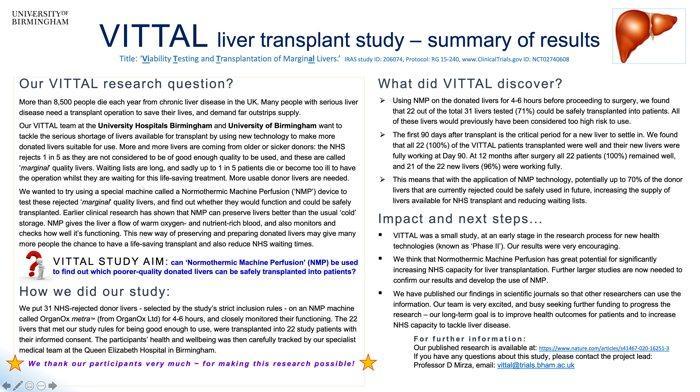VITTAL Study Summary
VITTAL Study Summary
The VITTAL Study investigated the use of a new technology called NMP to see if it allowed more transplants to safely take place. The VITTAL team have now produced a great summary of their research study, especially for patients:
VITTAL liver transplant study – summary of results
‘Viability Testing and Transplantation of Marginal Livers.
Our VITTAL research question?
More than 8,500 people die each year from chronic liver disease in the UK. Many people with serious liver disease need a transplant operation to save their lives, and demand far outstrips supply.
Our VITTAL team at the University Hospitals Birmingham and University of Birmingham want to tackle the serious shortage of livers available for transplant by using new technology to make more donated livers suitable for use. More and more livers are coming from older or sicker donors: the NHS rejects 1 in 5 as they are not considered to be of good enough quality to be used, and these are called ‘marginal’ quality livers. Waiting lists are long, and sadly up to 1 in 5 patients die or become too ill to have the operation whilst they are waiting for this life-saving treatment. More usable donor livers are needed.
We wanted to try using a special machine called a Normothermic Machine Perfusion (‘NMP’) device to test these rejected ‘marginal’ quality livers, and find out whether they would function and could be safely transplanted. Earlier clinical research has shown that NMP can preserve livers better than the usual ‘cold’ storage. NMP gives the liver a flow of warm oxygen- and nutrient-rich blood, and also monitors and checks how well it’s functioning. This new way of preserving and preparing donated livers may give many more people the chance to have a life-saving transplant and also reduce NHS waiting times.
VITTAL Study Aim
Can ‘Normothermic Machine Perfusion’ (NMP) be used to find out which poorer-quality donated livers can be safely transplanted into patients?
How we did our study
We put 31 NHS-rejected donor livers - selected by the study’s strict inclusion rules - on an NMP machine called OrganOx metra™ (from OrganOx Ltd) for 4-6 hours, and closely monitored their functioning. The 22 livers that met our study rules for being good enough to use, were transplanted into 22 study patients with their informed consent. The participants’ health and wellbeing was then carefully tracked by our specialist medical team at the Queen Elizabeth Hospital in Birmingham.
What did VITTAL discover?
- Using NMP on the donated livers for 4-6 hours before proceeding to surgery, we found that 22 out of the total 31 livers tested (71%) could be safely transplanted into patients. All of these livers would previously have been considered too high risk to use.
- The first 90 days after transplant is the critical period for a new liver to settle in. We found that all 22 (100%) of the VITTAL patients transplanted were well and their new livers were fully working at Day 90. At 12 months after surgery all 22 patients (100%) remained well, and 21 of the 22 new livers (96%) were working fully.
- This means that with the application of NMP technology, potentially up to 70% of the donor livers that are currently rejected could be safely used in future, increasing the supply of livers available for NHS transplant and reducing waiting lists.
Impact and next steps
- VITTAL was a small study, at an early stage in the research process for new health technologies (known as ‘Phase II’). Our results were very encouraging.
- We think that Normothermic Machine Perfusion has great potential for significantly increasing NHS capacity for liver transplantation. Further larger studies are now needed to confirm our results and develop the use of NMP.
- We have published our findings in scientific journals so that other researchers can use the information. Our team is very excited, and busy seeking further funding to progress the research – our long-term goal is to improve health outcomes for patients and to increase NHS capacity to tackle liver disease.
For further information:
Our published research is available at: https://www.nature.com/articles/s41467-020-16251-3
If you have any questions about this study, please contact the project lead:
Professor D Mirza, email: vittal@trials.bham.ac.uk

